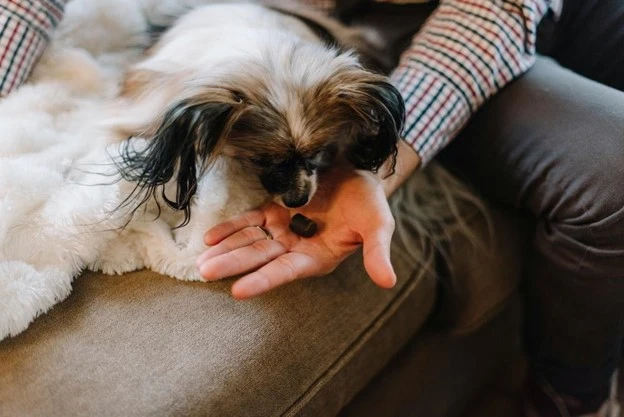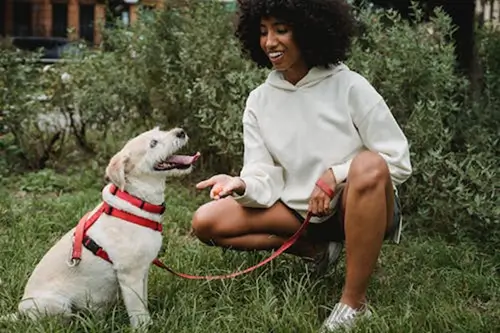Can CBD Dog Treats Help with Anxiety? A Vet’s Perspective on CBD for Pets

Your dog will most likely experience various stress-induced circumstances, mainly because of its relationship with people or exposure to multiple stressors in urban settings.
Mostly, these circumstances are unavoidable and relate to events like car travel or separation from owners.
A dog’s social nature creates a strong bond with humans, and breaking this bond may expose dogs to mild stress, which is fine.
However, prolonged stressors such as chronic physical, behavioral, and emotional health issues can compromise a dog’s overall well-being.
So, what should you do when your dog faces chronic or mild anxiety levels? What remedies do you have to calm your canine friend during such moments?
This post examines CBD treats’ role in calming anxious dogs.
Dog Anxiety: What Is It?
Detecting what exactly makes your dog nervous is difficult. Like people, a dog’s experience shapes its behavior and reactions to various stimuli. We can categorize dog anxiety based on the following causes.
Situational
This anxiety comes when a dog reacts to immediate triggers, such as thunder, lightning, loud noises, and fireworks. Aggression from other dogs or animals also triggers this anxiety.
Behavioral
This anxiety reflects a dog’s previous experiences, such as separation. Behavior-related stress varies, depending on the individual dog. For instance, a rescued dog can manifest behaviors related to its abuse.
An anxious dog manifests different symptoms. Some signs are obvious, while others can be subtle. Common and obvious signs include the following:
- Crying.
- Trembling.
- Aggression.
- Accidents in the house, although it’s house-trained.
- Poor appetite.
- Insomnia.
- Racing.
- Panting.
- Avoidance and withdrawal.
- Inability to settle down.
- Frequent changes in position.
- Excessive drooling.
- Excess licking.
- Eliminating in the house.
Some anxious and stressed dogs might show subtle signs, which dog owners are most likely to miss. Some of these symptoms are:
- Lip licking.
- Yawning.
- Tucking in the tail.
- Pulling the ears back.
- Showing the eyes’ whites.
What Causes Dog Anxiety?
It’s vital to understand that dogs are social animals that love company. Wild dogs live and walk in packs, creating a strong social bond around each other.
But when a domesticated dog lacks that social covering, it depends on humans to fill that void.
Therefore, a tamed dog is more exposed to anxiety when its owners are away. In the wild, dogs rarely separate themselves from the pack. That is why many dogs experience separation when left at home alone.
Below are the main causes of dog anxiety.
- Fear. Some dogs develop anxiety when they face animals, people, and threatening situations. These could be strangers, loud noises, unfamiliar environments, and negative experiences.
- Separation. A dog can feel anxious when separated from the family or changing homes. It may also feel anxious when left alone.
- Age. A dog can suffer age-related anxiety when it reaches an age that makes it experience confusion because of cognitive dysfunction syndrome (CDS). This condition is similar to Alzheimer’s Disease in people.
- Illnesses or pain. A sick or aching dog is prone to anxiety.
- A negative history. A dog that has suffered limited social contact, neglect, and confinement is exposed to fear-based and separation anxiety. Dogs that have spent time in shelters are more vulnerable.
How CBD Fights Dog Anxiety
Since canines suffer from anxiety and stress in many life circumstances, dog owners use different methods to manage those conditions.
For instance, they train them, give them medicines, and administer supplements. But the last two decades have seen a rise in cannabis-based products being used to manage anxiety.
CBD treats for large dogs and smaller ones are some of the most popular anxiety-management products on the market.
So, how does CBD alleviate anxiety? CBD interacts with the dog’s endocannabinoid system (ECS) and its cannabinoid receptors to restore body balance.
It also interacts with this system to alleviate other problems, like inflammation and pain. It calms the dog’s nervous system, relieving anxiety. Remember, the ECS regulates the body’s mood.
Thus, CBD’s impact directly promotes and accelerates calmness.
The Best Ways to Give a Dog CBD
You can administer CBD to your dog in various ways. CBD oils are the most popular forms many pet owners choose since they have droppers for measuring oil and administering the correct dose.
Moreover, you can serve the oil with food or a treat if the dog doesn’t love the oil’s taste.
CBD oil composition varies depending on terpene levels and potency.
You can select broad-spectrum CBD oil because it has the highest CBD components that enhance efficacy but is 100% THC-free.
Moreover, you can give your anxious dog CBD treats. However, prepare a good budget for treats if you wish to administer them long-term because they are costlier than oil.
So, do your math well, depending on your desired goal and outcome.
Tips for Preventing and Managing Dog Anxiety

Now, is dog anxiety preventable? Yes, it is in some circumstances, but you can’t eliminate it altogether. Management and treatment are your best tools. This section examines dog anxiety prevention strategies you may try out.
Prevention
- Read dog cues and body language. You can prevent anxiety by learning how to read your dog’s cues and body language when negatively reacting to stimuli. This way, you are better placed to comfort your canine pet and remove it from the environment or situation that stresses it when necessary/possible.
- Early introduction. Introduce your canine to new places, people, and experiences when it’s still young to get used to various circumstances early in life.
- Obedience training. Training your dog to obey develops a strong and trusting relationship between you and it. This way, the dog socializes with a feeling of security.
- Correct nutrition and enough exercise/playtime. Giving your dog the above makes it mentally and physically healthy, immunizing it from anxiety.
- Understand and avoid triggers. You can better help your dog if you know what triggers its anxiety by avoiding it whenever possible. For instance, if your dog feels uncomfortable around strangers, don’t carry it with you to a shopping mall or a football match.
Management
- Exercise. Spending enough time bonding with your pet through exercise and play is one sure way of helping a dog that’s vulnerable to separation anxiety.
- Physical contact. Physical contact is another way of calming an anxious dog. Patting the dog gently soothes them and relieves stress. Also, cuddling the dog on the couch or giving it a long petting session is a great way of calming a stressed dog.
- Massage. Massaging doesn’t calm and relax people alone; it also works the same soothing wonders for pets. An anxious dog or human has tense muscles, and massaging alleviates tension. You can start with the next and move downward with long strokes while keeping one hand on the dog. This way, you can better know where your pet holds its stress and focus the massaging on that particular region.
- Time-out. You can also give an anxious dog some time out to cool its nerves. Isolation in a safe and serene place is a good way of helping the canine calm down. Ensure the place has sweet and cool music or low lights. A sweet aroma can also help calm your dog.
- Music therapy. Lastly, soothe a stressed pet by exposing it to soothing music. Music therapy is proven as a beneficial calming remedy for people and canines. Music’s power is calming and relaxing at home, in the car, and when you are away. Playing comforting music is another great way of alleviating noise sensitivity by blocking scary noises that bother canines and make them anxious.
Dosage
Since we don’t yet have an industry-wide dosage standard, you will need to experiment until you find the ideal dose for your dog. The typical recommendation is 1–5 mg per 10 pounds of body weight. You can try half of that dose and watch for the effects. Increase the dosing only if you see no effects (and no allergies or side effects as well).
Regarding safety, a healthy dog easily tolerates CBD. However, we recommend consulting your vet if you wish to give your dog other anxiety medications before serving it CBD treats. A careful, experienced vet is familiar with CBD and can answer all your questions.
Parting Shot
There you go with everything you need to learn about CBD treats and how they help relieve anxious dogs. We hope you will use this valuable information to better your dog’s overall wellness and quality of life.





